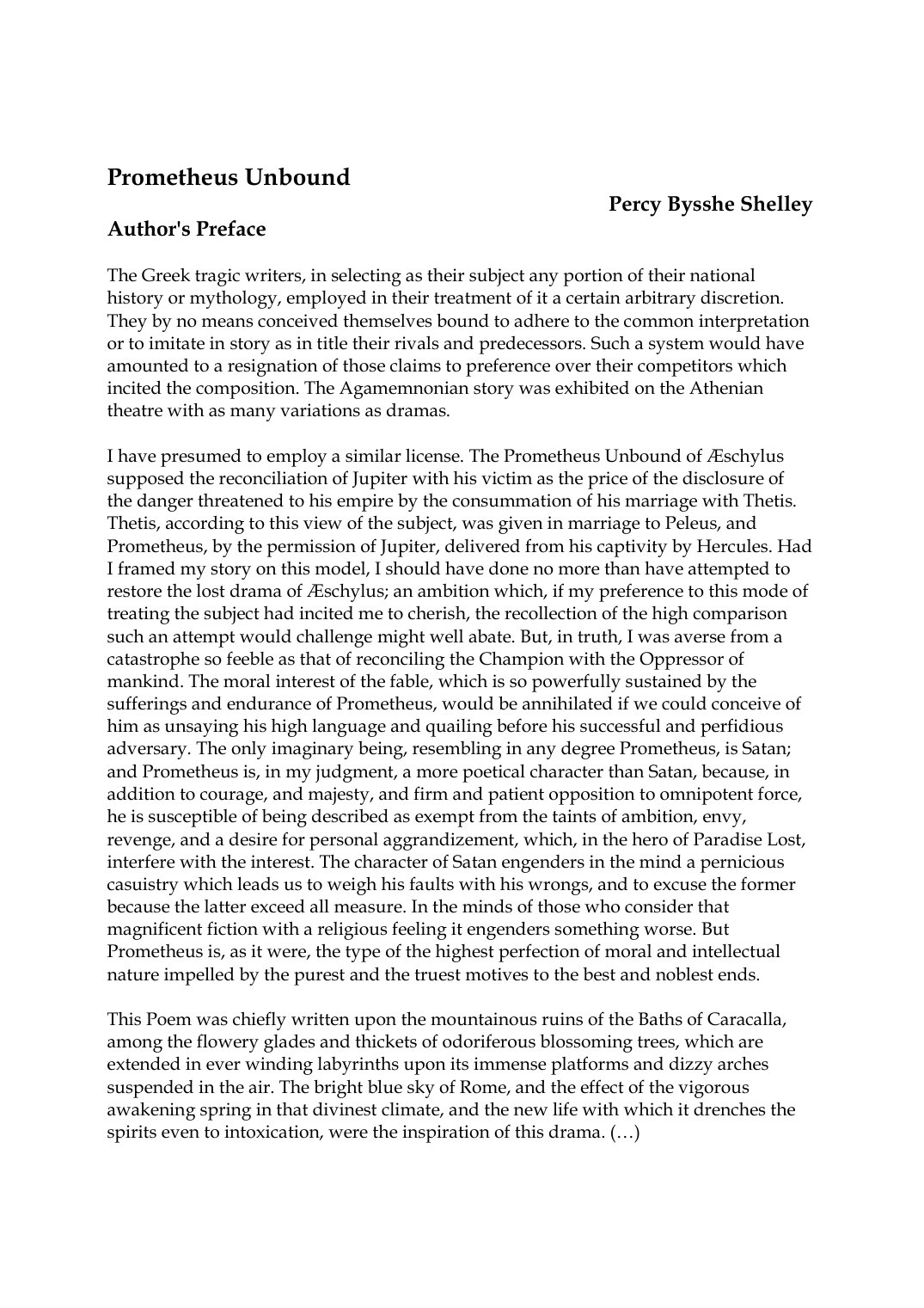Prometheus UnboundAuthor's PrefacePercy Bysshe ShelleyThe Greek tragic writers, in selecting as their subject any portion of their nationalhistory or mythology, employed in their treatment of it a certain arbitrary discretion.
Publié le 23/05/2020
Extrait du document
«
Prometheus Unbound
Percy Bysshe Shelley
Author's Preface
The Greek tragic writers, in selecting as their subject any portion of their national
history or mythology, employed in their treatment of it a certain arbitrary discretion.
They by no means conceived themselves bound to adhere to the common interpretation
or to imitate in story as in title their rivals and predecessors.
Such a system would have
amounted to a resignation of those claims to preference over their competitors which
incited the composition.
The Agamemnonian story was exhibited on the Athenian
theatre with as many variations as dramas.
I have presumed to employ a similar license.
The Prometheus Unbound of Æschylus
supposed the reconciliation of Jupiter with his victim as the price of the disclosure of
the danger threatened to his empire by the consummation of his marriage with Thetis.
Thetis, according to this view of the subject, was given in marriage to Peleus, and
Prometheus, by the permission of Jupiter, delivered from his captivity by Hercules.
Had
I framed my story on this model, I should have done no more than have attempted to
restore the lost drama of Æschylus; an ambition which, if my preference to this mode of
treating the subject had incited me to cherish, the recollection of the high comparison
such an attempt would challenge might well abate.
But, in truth, I was averse from a
catastrophe so feeble as that of reconciling the Champion with the Oppressor of
mankind.
The moral interest of the fable, which is so powerfully sustained by the
sufferings and endurance of Prometheus, would be annihilated if we could conceive of
him as unsaying his high language and quailing before his successful and perfidious
adversary.
The only imaginary being, resembling in any degree Prometheus, is Satan;
and Prometheus is, in my judgment, a more poetical character than Satan, because, in
addition to courage, and majesty, and firm and patient opposition to omnipotent force,
he is susceptible of being described as exempt from the taints of ambition, envy,
revenge, and a desire for personal aggrandizement, which, in the hero of Paradise Lost,
interfere with the interest.
The character of Satan engenders in the mind a pernicious
casuistry which leads us to weigh his faults with his wrongs, and to excuse the former
because the latter exceed all measure.
In the minds of those who consider that
magnificent fiction with a religious feeling it engenders something worse.
But
Prometheus is, as it were, the type of the highest perfection of moral and intellectual
nature impelled by the purest and the truest motives to the best and noblest ends.
This Poem was chiefly written upon the mountainous ruins of the Baths of Caracalla,
among the flowery glades and thickets of odoriferous blossoming trees, which are
extended in ever winding labyrinths upon its immense platforms and dizzy arches
suspended in the air.
The bright blue sky of Rome, and the effect of the vigorous
awakening spring in that divinest climate, and the new life with which it drenches the
spirits even to intoxication, were the inspiration of this drama.
(…).
»
↓↓↓ APERÇU DU DOCUMENT ↓↓↓
Liens utiles
- Chaos Greek
- To what extent can social media be a tool for the public to have their say in political matters
- From Bulfinch's Mythology: Apollo and Hyacinthus - anthology.
- Mythology.
- Deucalion - Mythology.

































